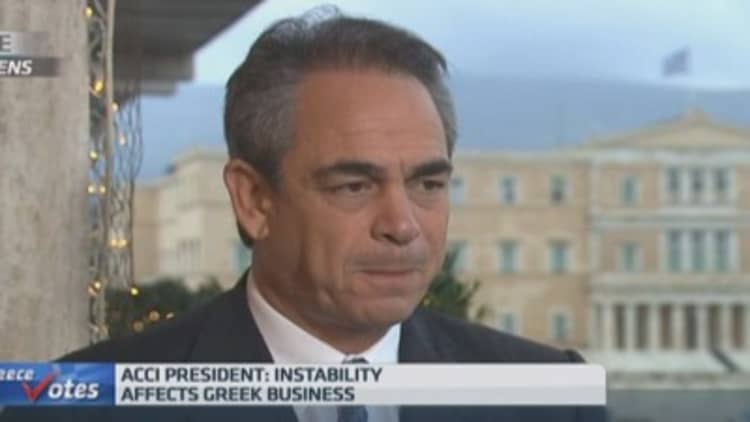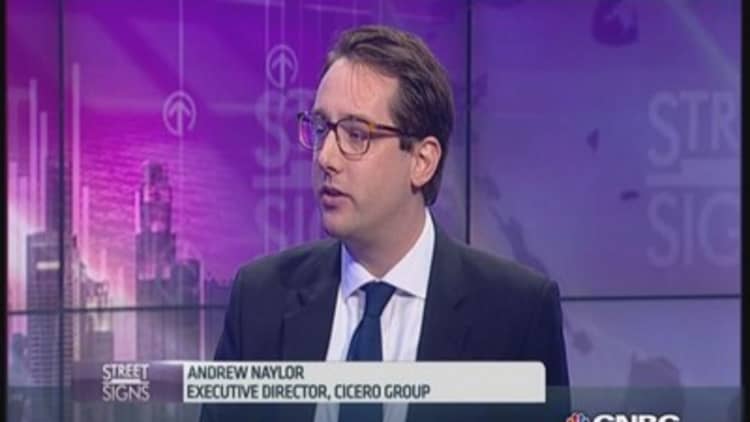


Greece has returned to political brinkmanship and recrimination as the country's lawmakers vote in a snap presidential election Wednesday. The result could spark further political uncertainty and economic turmoil for the country. Here's what you need to know:
What's it all about?
Greek Prime minister Antonis Samaras surprised markets last week when he announced he was bringing forward the vote to pick the country's president from early 2015 to this month. The announcement sent markets, already worrying about Greece's politics, into a tailspin. The Athens stock exchange plunged nearly 13 percent during the day – the worst loss since 1987.
The first of three rounds of voting in the Greek parliament start on Wednesday with further polls set on December 23 and 29 if a majority is not secured in the first round. In the first round, Samaras' pick -- Stavros Dimas, a former commissioner at the European Union -- will need to garner the 180 votes in parliament.

Return to Greece's bad old days?
The vote seen as a key test of confidence in the Samaras' government with the fear that if his candidate fails to get elected, a snap general election could be called. The prime minister warned last week that Greece could face a "catastrophic" return to financial crisis if his government fell as a result of the vote, Reuters reported.
The surprise move has also been widely seen as a risky attempt to wrongfoot the powerful opposition anti-austerity party, Syriza, which campaigns on a pledge to tear up the tough conditions of Greece's international bailout program.
Syriza leader Alexis Tsipras accused Samaras of sowing fear in the country to win support for a presidential vote. "The countdown for the ruling coalition and its catastrophic policies has already started," Tsipras said in a speech at the weekend, according to a Reuters report.
Read MoreWhy the Greekselloff is exaggerated
Why should we care?
Although the role of president is a largely ceremonial one, a loss for Samaras' candidate will mean that a general election is a certainty.
If that happens, there is a distinct possibility that Samaras' pro-bailout party could lose as voters voice their frustration at the strict austerity measures imposed by Greece's international lenders in return for the country's 240 billion euro ($290 billion) bailout program.
With its promise to tear up the bailout conditions, Syriza has become popular among Greek voters. In a survey of voting intentions conducted in early December, Syriza was ahead of Samaras' New Democracy party in the polls with 27.5 percent of the vote versus 23 percent for the ruling party, according to a survey by Greek research consultancy, Pulse RC.
"Everything is hanging by a thread … and if it is cut, it could lead the country to absolute catastrophe," the deputy premier, Evangelos Venizelos, said at the weekend according to various news reports.
Just the announcement of the early presidential vote was enough to shake Greece's investors and push the yield on Greek government debt higher.
Read MoreGreece could miss New Year's end-of-bailout celebration
Is a 'Grexit' on the cards?
European officials are also worried that Greece could ultimately leave the euro zone if Syriza did come to power.
Jean-Claude Juncker, the president of the European Commission, warned Greeks that the country would face major problems if they voted the "wrong" way in the forthcoming polls. In remarks made
last Thursday to Austrian broadcaster ORF, Juncker added that he "wouldn't like extremist forces to take the wheel" and would prefer to see "familiar faces" in charge.
Read MoreGreece can't afford another crisis: Former PM
On Monday, the European Union's finance commissioner, Pierre Moscovici, flew into Athens to discuss the country's economic reforms that Greece must make if it is to receive the last tranche of bailout aid, worth 1.8 billion euros.
Greece desperately needs the confidence of investors and international markets if it is to regain international financial credibility. Its debt to GDP ratio is the highest in the euro zone, at 174 percent and it has the highest unemployment rate, of 25.7 percent in September. Among 15-24 year olds, the figures are more disheartening, with 49.3 percent of young people out of work.
- By CNBC's Holly Ellyatt, follow her on Twitter @HollyEllyatt. Follow us on Twitter: @CNBCWorld


